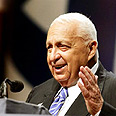
Sharon in America
Photo: AP
Using impressive marketing abilities, the prime minister was able to present the disengagement from Gaza – an important, historical step, but merely tactical in and of itself and limited in its implications - as a wide-ranging, strategic move.
However, Sharon, whose political moves were never suspected to be derived from orderly, national strategy (with the possible exception of "Jordan will be Palestine") may become the victim of his own success.
Alon Pinkas is the former Consul General in New YorkHe was able to convince U.S. President George W. Bush and the Israeli public that "only he can do it," and was perceived as a leader pursuing a grand strategy.
Sharon in America
By Yitzhak Benhorin and Efrat Weiss
Prime minister addresses 1,200 Jewish group leaders in New York, says million Jews must be brought to Israel in next 15 years; earlier, Sharon’s speech disrupted by anti-disengagement protesters
The American administration expects the withdrawal to be completed in full and according to the timetable Israel has committed itself to.
Yet after the pullout, everyone will wonder – Bush, Blair, the European Union, and also the Israeli public – what is, in Sharon's mind, the next step? How does he see the "Day After"?
The purpose of his visit to the U.S. this week was defined by Sharon as the tightening of ties with American Jewry and the enlistment of its support for the disengagement. This came after about three years where the prime minister did not pay much attention to community leaders during his trips to Washington and New York.
Avoiding meetings with U.S. officials
Sharon believes in the centrality and political prowess of American Jewry. However, he found it sufficient to glance at public opinion polls indicating the diversity of opinion among American Jews is virtually identical to that of their Israeli counterparts: Close to 60 to 65 percent support of the move, another 15 to 20 percent showi conditional support, with doubts regarding the plan's feasibility and utility, while about 20 percent object.
What, then, was Sharon's political objective in the visit, considering the fact he chose to refrain from any meetings with senior American officials?
Usually, the prime minister visits the annual AIPAC conference (always in May) along with meetings at the White House and State Department, and does not schedule a meeting with the president at his ranch a month and a half before that.
This time, the objective was to demonstrate Sharon's determination and seriousness to the Administration.
The avoidance of meetings with decision-makers in Washington was meant to spare embarrassing questions for which Sharon has no answers at the moment, as a result of a lack of strategic vision or internal coalition-related considerations.
Sharon knows full well that Israeli-American relations are stable and deeply rooted. The commonality of values and broad strategic objectives in the Middle East constitute a basis for the solid personal relationship the prime minister has nurtured with Bush.
However, Sharon is also well aware of the underground currents, mostly hidden from view to the casual observer. Those currents manifest themselves in the harsh tones in the relationship between the two countries' security and intelligence agencies, and are certain to reach the political echelons, in the event of a failure to continue beyond the Gaza exit.
Different interpretations
In fact, once Administration officials compare the speech delivered by Secretary of State Condoleezza Rice before the AIPAC crowd to Sharon's speech, they would discover (again) that Sharon's interpretation of President Bush's 2004 letter regarding demographic changes in the West Bank is different than the American interpretation.
Indeed, there is a difference between the term "population centers" and the term "settlement blocs."
The Administration deliberately chose not to emphasize the different interpretations, in order to safeguard the "treasure," Sharon.
Washington would not tolerate a postponement or only a partial implementation of the disengagement, but would also not be satisfied once the move is realized.
The Americans need legitimacy and multilateralism in the process of exiting from Iraq as part of a regional policy. Hence, they would not be able to allow Sharon to rest on his laurels without further action for a whole year following the disengagement with the argument that "the wound at the nation's heart must be healed."
Even the classic argument-excuse, "I have problems within my Likud party, elections may be pushed forward, I cannot proceed," would not work.
At this point there is already discomfort among Administration officials over the lack of connection between the disengagement policy and a wider-ranging move.
This is the difference between tactic and strategy, and between a successful and a semi-successful visit.















